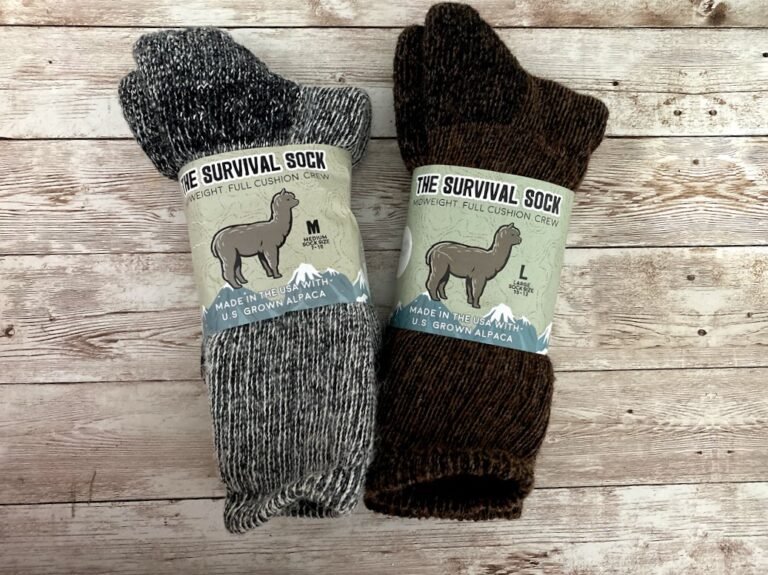Hemp vs. Organic Cotton Socks: Which Is More Eco-Friendly?
When comparing hemp and organic cotton socks, you'll find that hemp is the more eco-friendly choice. It requires less water, fewer chemicals, and supports healthier soil, making it more sustainable overall. Hemp fibers also provide greater durability, extending the lifespan of your socks. While organic cotton is softer, it consumes more resources and takes longer to decompose. Want to explore the nuances of these materials and their impacts? There's more to discover about their benefits and ethical considerations.
The Production Process: Hemp vs. Organic Cotton

When comparing the production processes of hemp and organic cotton, it's important to recognize that each material has distinct environmental impacts and cultivation methods. Hemp cultivation requires fewer pesticides and herbicides, promoting healthier soil and biodiversity. Its deep-root system helps prevent soil erosion, making it a sustainable choice. In contrast, cotton farming is often resource-intensive, traditionally relying on significant water usage and chemical inputs. Organic cotton does reduce some harmful practices, but it still demands more water than hemp. Additionally, hemp grows faster, reaching maturity in about four months, while organic cotton takes longer. This faster growth cycle allows for more frequent harvests, potentially leading to increased sustainability in hemp production. Understanding these differences is essential for informed choices.
Resource Consumption and Environmental Impact
Although both hemp and organic cotton are considered more sustainable alternatives to conventional textiles, their resource consumption and overall environmental impact differ greatly. Hemp requires considerably less water usage compared to organic cotton, making it a more efficient choice for those concerned about water scarcity. Additionally, hemp's deep roots help improve soil health by preventing erosion and promoting nutrient retention. In contrast, while organic cotton supports healthier soil than conventional cotton, it still demands more water and land resources. Consequently, if you're prioritizing eco-friendliness in your sock choices, hemp's lower water needs and positive effects on soil health can make it the more advantageous option. Ultimately, understanding these factors can guide you toward a more responsible choice for the environment.
Durability and Longevity of Socks
While both hemp and organic cotton socks offer benefits, their durability and longevity can greatly impact your choice. Hemp fibers are known for their exceptional wear resistance, making hemp socks generally more durable than their cotton counterparts. This means they tend to withstand the rigors of daily use better, leading to a longer sock lifespan. Organic cotton, while softer and more comfortable, might not hold up as well under heavy wear. If you prioritize longevity and resistance to degradation, hemp could be the ideal choice for you. However, if comfort is your main concern, organic cotton might be worth considering despite its potentially shorter lifespan. Ultimately, your decision should reflect your values and lifestyle needs.
Biodegradability and End-of-Life Options

Given the increasing focus on sustainability, understanding the biodegradability and end-of-life options for hemp and organic cotton socks is essential for environmentally conscious consumers. Hemp socks typically break down faster in composting environments due to their natural fibers, making them a strong candidate for eco-friendly disposal. On the other hand, organic cotton socks also offer composting options, but their decomposition can take longer depending on various factors like soil conditions. Recycling programs exist for both materials, but they vary in accessibility. While hemp's overall lifecycle tends to be more sustainable, both materials provide viable end-of-life solutions, allowing you to make responsible choices that align with your values and commitment to the planet.
Consumer Choices and Ethical Considerations
As consumers increasingly prioritize sustainability, the choices they make regarding hemp and organic cotton socks reflect broader ethical considerations. By opting for these materials, you're not just choosing comfort; you're engaging in sustainable fashion that supports ethical sourcing. Your decisions can encourage brands to adopt greener practices, impacting the industry as a whole.
Consider these factors when making your choice:
- Environmental impact: Assess the lifecycle of the materials.
- Production practices: Investigate how the materials are sourced.
- Labor conditions: guarantee fair wages for workers.
- Longevity: Determine the durability of the socks.
- Waste reduction: Evaluate the end-of-life options for both materials.
Your choices matter, contributing to a more ethical and sustainable future.
Frequently Asked Questions
How Do Hemp and Organic Cotton Socks Feel When Worn?
When you try on hemp and organic cotton socks, you'll notice a texture comparison. Hemp tends to be coarser, while organic cotton feels softer, affecting your comfort levels. Ultimately, personal preference plays a significant role in your experience.
Are There Specific Brands Known for Eco-Friendly Hemp or Cotton Socks?
Did you know that sustainable brands are increasing by 20% annually? When seeking eco-friendly materials, consider brands like Bombas and Patagonia, known for their commitment to producing high-quality socks with hemp and organic cotton.
Can Hemp Socks Irritate Sensitive Skin Compared to Organic Cotton?
Hemp socks might cause skin irritation for some, especially if you're sensitive. However, their natural fabric breathability often mitigates discomfort, while organic cotton typically offers a softer feel, making it less likely to irritate your skin.
What Are the Price Differences Between Hemp and Organic Cotton Socks?
When you compare prices, hemp socks often cost slightly more than organic cotton due to sustainable fashion practices. However, considering their environmental impact, investing in hemp might be worthwhile for long-term benefits and durability.
How Do Washing Instructions Differ for Hemp and Organic Cotton Socks?
Washing instructions for hemp and organic cotton socks are like different pathways in a garden. Hemp prefers cooler washing temperatures and air drying, while organic cotton can handle warmer washes and tumble drying for convenience.







